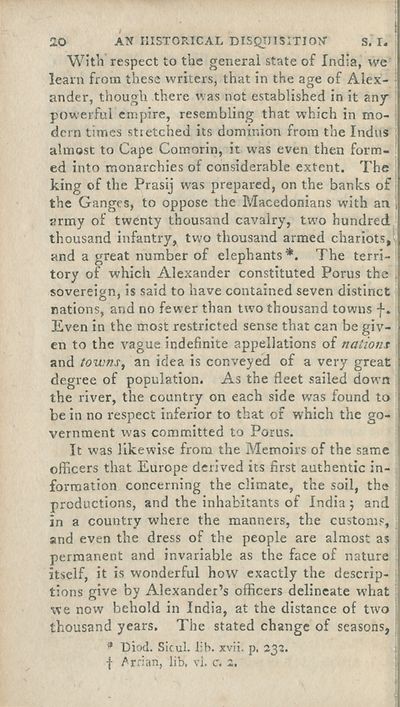Occupations > Historical disquisition concerning the knowledge which the ancients had of India; and the progress of trade with that country
(34)
Download files
Complete book:
Individual page:
Thumbnail gallery: Grid view | List view

20 AN HISTORICAL DISOrnSITIOtT S. I.
With respect to the general state of India, we
learn from these writers, that in the age of Alex¬
ander, though there was not established in it any
powerful empire, resembling that which in mo- 1
dcrn times stretched its dominion from the Indus
almost to Cape Comorin, it was even then form¬
ed into monarchies of considerable extent. The
king of the Prasij was prepared, on the banks of
the Ganges, to oppose the Macedonians with an
army of twenty thousand cavalry, two hundred
thousand infantry, two thousand armed chariots,
and a great number of elephants*. The terri¬
tory of which Alexander constituted Poms the j
sovereign, is said to have contained seven distinct
nations, and no fewer than Uvo thousand towns f.
Even in the most restricted sense that can be giv¬
en to the vague indefinite appellations of nations
and towns, an idea is conveyed of a very great
degree of population. As the fleet sailed down
the river, the country on each side was found to
be in no respect inferior to that of which the go¬
vernment was committed to Porus.
It was likewise from the Memoirs of the same
officers that Europe derived its first authentic in¬
formation concerning the climate, the soil, the
productions, and the inhabitants of India ; and
in a country where the manners, the customs, j
and even the dress of the people are almost as
permanent and invariable as the face of nature
itself, it is wonderful how exactly the descrip¬
tions give by Alexander’s officers delineate what
we now behold in India, at the distance of two
thousand years. The stated change of seasons,
* Diod. Sicul. lib. xvii. p. 231.
f Arrian, lib, vi. c. 2.
With respect to the general state of India, we
learn from these writers, that in the age of Alex¬
ander, though there was not established in it any
powerful empire, resembling that which in mo- 1
dcrn times stretched its dominion from the Indus
almost to Cape Comorin, it was even then form¬
ed into monarchies of considerable extent. The
king of the Prasij was prepared, on the banks of
the Ganges, to oppose the Macedonians with an
army of twenty thousand cavalry, two hundred
thousand infantry, two thousand armed chariots,
and a great number of elephants*. The terri¬
tory of which Alexander constituted Poms the j
sovereign, is said to have contained seven distinct
nations, and no fewer than Uvo thousand towns f.
Even in the most restricted sense that can be giv¬
en to the vague indefinite appellations of nations
and towns, an idea is conveyed of a very great
degree of population. As the fleet sailed down
the river, the country on each side was found to
be in no respect inferior to that of which the go¬
vernment was committed to Porus.
It was likewise from the Memoirs of the same
officers that Europe derived its first authentic in¬
formation concerning the climate, the soil, the
productions, and the inhabitants of India ; and
in a country where the manners, the customs, j
and even the dress of the people are almost as
permanent and invariable as the face of nature
itself, it is wonderful how exactly the descrip¬
tions give by Alexander’s officers delineate what
we now behold in India, at the distance of two
thousand years. The stated change of seasons,
* Diod. Sicul. lib. xvii. p. 231.
f Arrian, lib, vi. c. 2.
Set display mode to:
![]() Universal Viewer |
Universal Viewer | ![]() Mirador |
Large image | Transcription
Mirador |
Large image | Transcription
| Antiquarian books of Scotland > Occupations > Historical disquisition concerning the knowledge which the ancients had of India; and the progress of trade with that country > (34) |
|---|
| Permanent URL | https://digital.nls.uk/125576181 |
|---|
| Description | Thousands of printed books from the Antiquarian Books of Scotland collection which dates from 1641 to the 1980s. The collection consists of 14,800 books which were published in Scotland or have a Scottish connection, e.g. through the author, printer or owner. Subjects covered include sport, education, diseases, adventure, occupations, Jacobites, politics and religion. Among the 29 languages represented are English, Gaelic, Italian, French, Russian and Swedish. |
|---|

